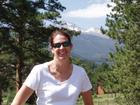This afternoon's sessions brought us up to date with the work that's going on at TDL. It's really pretty amazing.
A couple of faculty from the ISchool here at UT Austin, Unmil Karadkar and Luis Francisco-Revilla, suggest that one solution for meeting TDL's increased needs (financial, temporal, human resources) is to partner with other units on TDL campuses. Not to be confused with the beta versions of institutional IRs hosted by TDL e.g. http://labs.tdl.org/tamucc-ir, TDL Labs is a test bed for that collaboration. Among their ideas are research conducted by students and a collaborative matchmaking database where projects for which specific skills are needed would be matched with scholars at TDL institutions who possess those skills.
Peter Nurnberg, Chief Technology Officer for the Texas Digital Libraries, presented an update of progress on Vireo, TDL's electronic thesis and dissertation management software. Although not all TDL institutions are using Vireo, they have deployed Vireo lab instances for all TDL institutions in order to respond to requests for trials more quickly. Of the TDL institutions that are in production with Vireo, Texas
A&M and Texas Tech maintain their own Vireo servers, the rest are hosted at TDL and thus upgraded all at the same time and in the same way.
They’re going to put Verio into open source production on 1 September 2010. Both MIT and the University of Illinois Urbana-Champaign have signed on as developers/users and they’re in talks with the California Digital Library.
One of the really interesting things about this conference is learning a little more about the software development process and work flows for collaboration and momentum and development methodologies like kanban (used for Vireo) and scrum (used for TDL).
Finally, Mark McFarland, co-director of TDL, gave an update on TDL overall. He recapped some of what was included in the Vireo update and then moved on to several other TDL project. First, TxLOR (Texas Learning Objects Repository) will be “hardened” (that's a development term I learned that means settled on for sure) this summer and deployed this fall. Their other focus for the upcoming summer is the Preservation Network.
Mark also mentioned that TDL has signed a contract Texas Advanced Center for Computing which will provide them with 80 terabytes of storage (that's 1024 gigs per terabyte). They'll distribute this to TDL member institutions at a minimum of 8 TB for each Tier 1 institution, 4 TB for each Tier 2 institution and 2 TB for Tier 3 institutions. These minimum amounts will be included in each institution's membership fees. Additional storage will be available at an additional, but still deeply discounted prices.
They've also done some work on providing usage stats to TDL members. They’ve outsourced the development and plan to begin to integrate it into TDL over the summer. And finally, they’ve “gotten out of the business” of "hand holding" through the Shibboleth install process. Paul Caskey from LEARN is now providing Shibboleth support for TDL members.

Subscribe to:
Post Comments (Atom)
Live chat
About Me

- SWS
- I am... a wife a daughter a sister/sister-in-law an aunt a reader a librarian a doctor a quilter a niece a grandmother ;-) a cat owner 6 feet 1 inches tall a yoga enthusiast a cook
No comments:
Post a Comment